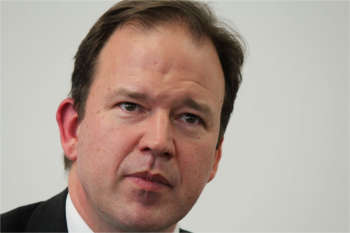When he arrived at the ministry, Department for Transport (DfT) officials said they were impressed with Jesse Norman's sense of purpose in tackling the brief and its many potholes.
The recent Budget announcement showed the DfT's political team is advancing a strong argument with the Treasury over the need for roads funding. Perhaps the influence of Mr Norman - tipped as a rising star in the Conservative party - has had an impact, on top of secretary of state Chris Grayling's of course, a close ally of the prime minister's.

Transport minister Jesse Norman
Mr Norman's CV certainly makes interesting reading and includes working as a director at Barclays and a on a 'charitable project in Communist Eastern Europe'. He has also researched and taught philosophy at University College London and written a book about Adam Smith.
Transport Network had the chance to talk with Mr Norman at a recent industry event, where he was on bold form, buoyed no doubt by the Budget success. He towered over the crowd gathering around him when he came off stage, shaking hands with Highways England chief executive Jim O'Sullivan, the first to speak to him, and confirming a meeting with an aide. 'We have Jim booked in for next week don't we?'
Even to this journalist he appeared remarkably friendly, introducing himself as 'Jesse', and eager to talk, time allowing.
In the Budget the chancellor said we would get no more PFIs, which was originally slated to finance Stonehenge the Lower Thames crossing. How will we pay for these schemes without private finance?
The chancellor said he was ending PFI he did not say he was ending private finance. The question now is what is a sensible basis on which private finance can or should be deployed in road schemes and I think the Government is perfectly clear: whatever the changes that are going to be made as a result of his announcement, they are not going to effect the deliverability of schemes we have in process.
Much of our supply chain and workforce does come from Europe, how are we going to make up that shortfall come Brexit day?
We are very confident there is going to be a deal and it is going to involve not just fluid movement of freight but also sensible arrangements that will allow the industry to continue to flourish.
There will be special arrangements for highways?
This is a Home Office matter; I can’t comment on that and I am not privy to that. But it is certainly true that we are focused on making sure all sections of industry continue flourish after it. And as you see the UK economy despite many of the gloomy predictions continues to grow and actually rather fast for this point in the economic cycle.
Do you think there is a danger of induced demand in some of the schemes we are putting through at the moment?
Let's be clear when we say induced demand what you mean is, people using them.
More people than might have otherwise.
Right, but listen: we want people to move effectively, smoothly and efficiently around and I said it is very important to make sure transport is properly integrated both across different modes and with new developments to ensure that flow is smooth. Some of those concerns people have about induced demand are reflective of schemes where that hasn’t always been the case in the past.
Register now for full access
Register just once to get unrestricted, real-time coverage of the issues and challenges facing UK transport and highways engineers.
Full website content includes the latest news, exclusive commentary from leading industry figures and detailed topical analysis of the highways, transportation, environment and place-shaping sectors.
Use the link below to register your details for full, free access.
Already a registered? Login